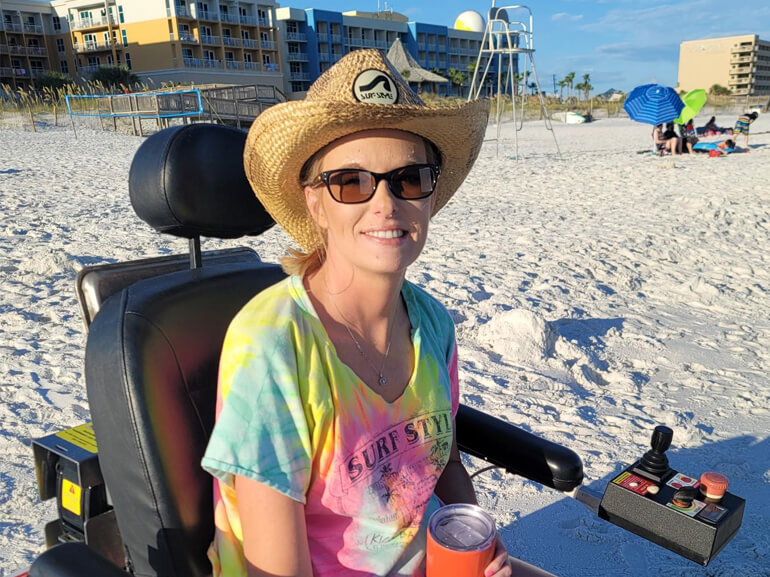Miranda's Story

Miranda Gill, 34, is a mother of three who lives in Slidell, Louisiana, and works as a veterinary technician. She takes medication daily for a seizure disorder, so when she was found unresponsive on her bathroom floor by her husband, Jared, she was rushed to the hospital. Doctors initially treated her for a grand mal seizure, however extensive testing revealed she had suffered a type of stroke affecting her brain stem, which can be particularly devastating and result in paralysis.
Due to the massive stroke and the resulting seizure, Miranda was having trouble breathing so she was intubated to protect her airway and aid in breathing. She was also put into a medically induced coma to help her body and brain rest. Her doctors realized Miranda’s needs required a more extensive level of care so the decision was made to life flight her to Ochsner Main Campus. After stabilizing there and in consultation with doctors and family, Miranda was ready for more intensive rehabilitative therapy intervention and was transferred to Northshore Rehabilitation Hospital to continue her recovery.
When admitted, Miranda couldn’t walk, had significant weakness in her right arm and leg and required maximal assistance with standing. In addition to the lack of strength in her right extremities, the main part of her body was weak and she had poor awareness of the right side of her body. As a result, Miranda was unable to bathe or dress herself, walk, or get in and out of bed without assistance.
Miranda’s physical therapy team initially focused on her core body control, leg strengthening and standing balance in the parallel bars. As she gained strength, her physical therapist guided her on taking steps in the parallel bars and using the therapy gym’s Tollos overhead support system to help her practice walking in free space. Soon she was able to advance her right leg on her own, which was an important development. After 28 days of inpatient rehabilitation, Miranda was able to transfer from the bed to a wheelchair and walk up to 35 feet, both with only minimal assistance.
In occupational therapy, the team worked with Miranda to increase her functional skills related to activities of daily living. Initially only able to feed herself and brush her hair, Miranda worked on range of motion exercises with her left arm to improve flexibility and her occupational therapist used electrical stimulation to her hand and arm to increase the neurological input to her brain. Occupational therapy also focused on self-care activities, teaching Miranda and Jared new, safer ways of completing them. At the time of discharge, Miranda could complete most self-care independently, and her husband was well trained to help her with any needs.
Speech Therapy was also an important part of Miranda’s recovery journey at Northshore Rehabilitation Hospital. When admitted, she had significant difficulty with swallowing and speech. Miranda’s speech therapist worked with her daily to increase her vocal cord and oral coordination. She also worked with Miranda to improve her breathing and swallowing coordination. At the time of discharge, Miranda’s speech skills had improved by 30 percent and her swallowing had also measurably improved.
Miranda’s family support was key to her recovery. Jared spent every night by her side. When discharged, Miranda was looking forward to going home and seeing her children as she missed them very much. Although she was excited to go home, leaving Northshore Rehabilitation Hospital was emotional. Miranda smiled and cried as she told everyone at the hospital how much she would miss them.
Miranda plans to continue regaining strength and skills through outpatient physical, occupational and speech therapy as she continues her recovery journey with determination and family support.